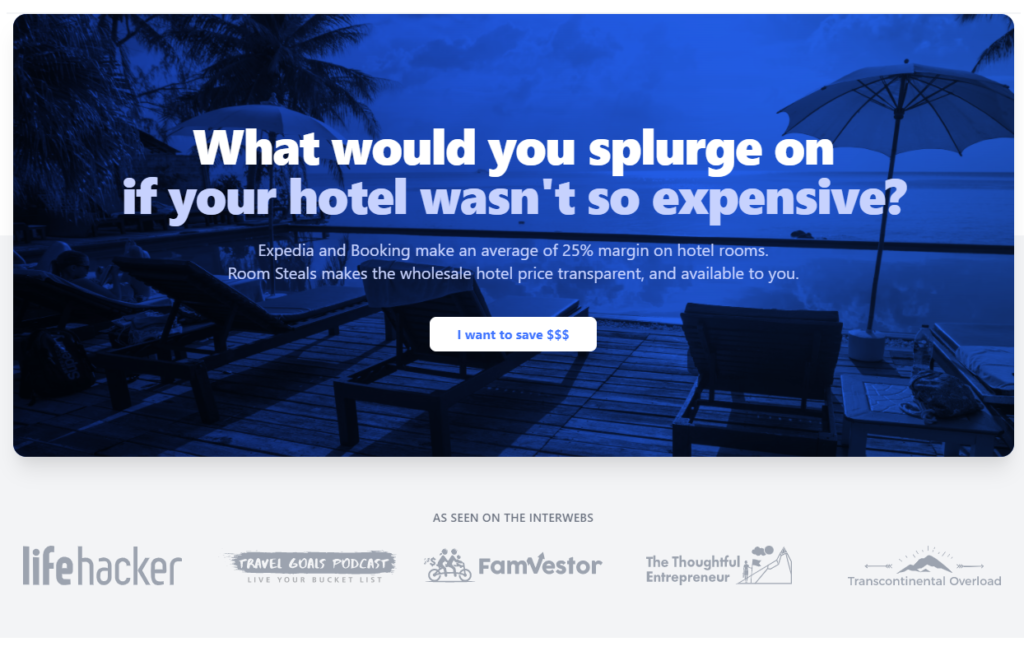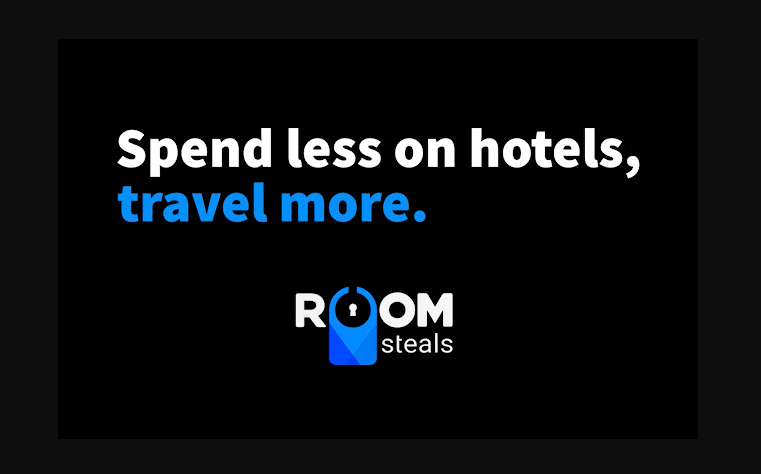Welcome to the second installment in my Founder Spotlight series!
In these posts, I’m interviewing founders and makers from around the world. No criteria on company size or industry, so long as the founder is willing to be open and honest about their journey.
Today I interviewed is Nate Ritter, founder of Room Steals. Room Steals is a hotel search engine like Expedia and Booking, but with a creative twist. Read more to learn about what makes Room Steals different and what Nate’s learned building this on his own.
First, more about you. What are you all about? What’s your background? Why did you choose to build your own product?

I’m a technical entrepreneur and travel hacker (my family and I had previously traveled for 10 years without paying for a hotel or flight). I’ve been a consultant to Fortune 1000’s and startup Chief Technical Officer. I’ve always had some business running during my life, and at times I run those businesses full time. But life ebbs and flows, so sometimes I’m working for someone else.
I built Room Steals while working for a hotel brokerage company and finding a source of inventory nobody was talking about. Being a travel hacker, and not having seen this before, I thought the world should know about this, and the way the hotel industry truly works – why we haven’t seen this before.
Wow! So what exactly does Room Steals do? Who did you build it for? Why should anyone use it?
Room Steals is a hotel search engine just like Expedia and Booking, but instead of keeping all the margin and commission for ourselves, we give it all back to the member. We are like the Costco of hotels, with a small annual membership required to book wholesale hotel rates at 600,000+ hotels around the world.
The question is, what would you spend your money on if you didn’t have to spend so much on hotels? Massages? Bungie jumping? Tours or other experiences?
Did you do market research before launching Room Steals? If so, what kind? And what did you learn about your market?
Well, I was working at a hotel brokerage company at the time, so I knew the market size is massive. I didn’t do much market research on the product since it’s somewhat commoditized. It’s really the revenue model that’s unique in the industry. We’ve flipped it upside down, giving all the transactional revenue back to the consumer and taking a membership fee instead.

Beyond customer feedback, what kind of market research are you doing these days? What have you been learning lately about your market?
Almost all research we do is customer-based.
Of course we pay attention to trends, but they don’t dictate our product. These days, we’re looking at who gets the most value out of Room Steals. It’s quite apparent that it’s travel agents booking for their customers, businesses booking travel for their employees, and vacationers who want to go somewhere special for a week or two.
The more you, your customers, or your employees travel, the more Room Steals makes sense.
Sounds like you’re still at the beginning of your journey. But what are you most proud of so far? What milestones have you hit?
We lasted through the pandemic unscathed so far. In fact, about a year after it started, we have done even better.
I’m also very proud that our churn rate is about 1.3% which is unheard of in SaaS.
Whoa, whoa. Stop there. 1.3% is amazing! How have you done that?
Two things.
First: With an annual plan, we give people enough time to get massive value out of the subscription. They pay $95/year and easily gain that back in the first booking. In fact, we don’t even ask for the $95 until they KNOW they will save more than that by booking with us. So it’s easy when the next year comes around to remember that (and we will soon be reminding them how much they saved before the subscription charges for the next year but haven’t felt the need to do that yet to retain them).
Second, every so often we up the prices. We’ve saved people so much money on average we’ve felt comfortable upping the prices once a year or two. This has a huge effect on the psychology of a subscriber because we don’t increase the price on current subscribers, and won’t, ever. We still have subscribers on our first $1.99/mo plan because they know if they leave and come back later they will lose that massive difference between their plan and the current/future pricing. Same with our old $59/year plan members. And when we released our $295 lifetime membership for a weekend, people jumped on it because they knew it was likely to not be that cheap in the future (and they probably saved that amount in the first year anyway).
Great! Awesome stuff here. To close, what’s one thing you’d tell a founder trying to build and launch their first product?
Build an MVP or quick prototype and prove that you know who your users are and how you have access to them before you build. This is likely the last business I’ll create without doing that first. It saves so much time, money, and energy!
Thanks! Last question: Imagine you’re required to take a month-long vacation. All-expenses paid. Where do you go? What do you do?
So many places!
If someone else was paying, I’ll say Japan. It’s one of the places where I’d expect to need some time and space to acclimate and think because it would be so different, and it’s expensive to go there. But I would absolutely love to visit Japan.
To learn more from Nate, you can follow him on Twitter. Learn more about Room Steals at roomsteals.com.

Inspired by Nate’s journey? Launch your a market research survey today. Every successful venture begins with feedback from real consumers. Let’s get building!
